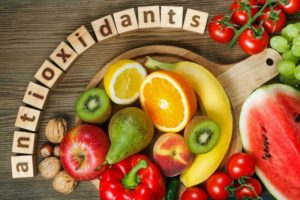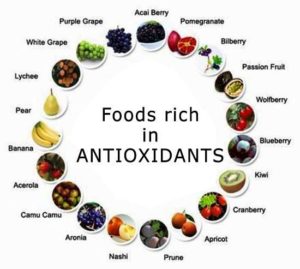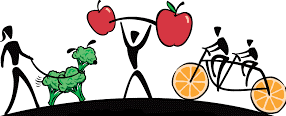A is for August and for Antioxidants
This month’s hot topic to address is the benefits of consuming antioxidants. Many people have heard of antioxidants, but may not be aware of what it actually is and what it does for the body that makes them beneficial. Well, read on, and you will know all about antioxidants!
An antioxidant is a dietary substance that can prevent damage to the cells in the body or repair damage that has already been done.
Damage can occur due to oxidation, which is the process of atoms loosing electrons and becoming “free radicals”. If atoms remain unstable due to the loss of an electron, they have the ability to make other atoms unstable, damaging or destroying cells. Free radicals may also be developed due to exposure to sunlight, radiation, pollution, and other toxic substances.
Antioxidants help by donating electrons to unstable atoms or by converting and excreting them out of the body. Research suggests that if the body undergoes oxidative stress, it may be the cause of the formation of medical and chronic conditions, such as cancer or heart disease.
Here’s an easy tip: Think of it antioxidants as being “against oxidation”.
Red Wine and Flavonoids
Flavonoids are water soluble molecules with antioxidant affects. They are derived from fruits, vegetables and wines. Flavonoids cause the body to reduce the oxidation of lipoproteins, especially LDL, the bad cholesterol. They also help raise HDL, which is the good cholesterol.
Consumption of flavonoids can assist in the reduction of both systolic and diastolic blood pressures, total cholesterol, and decrease stroke risks.
Many studies show that having 1 glass of red wine a day may decrease risk of coronary heart disease.
However, put your goals in perspective – Wine also has calories and may diminish ones results for weight loss. Furthermore, Red wine has also been shown to increase the risk of breast cancer. You can get flavnoids from various other food sources with less calories, and less risk of breast cancer such as citrus fruits, berries, legumes and grapes.
Nutrients as Antioxidants:
Antioxidants are found in a variety of foods, including many fruits and vegetables, nuts, grains, and some meat, poultry and fish.
Antioxidant substances are found in foods containing Vitamin A, Vitamin C, Vitamin E, Selenium, and Beta-carotene. Here are examples of foods with these specific nutrients:
- Vitamin E- Vegetable Oils, Nuts, Seeds, Soybeans, Wheat Germ.
- Vitamin C- Many fruits and vegetables, grapefruit, oranges, potatoes, broccoli, etc.
- Vitamin A- carrots, spinach, mango, milk, margarine, fortified cereals
- Beta carotene- red, orange, yellow, and deep-green foods.
An Easy, Yummy Antioxidant Dessert:
All you need is fruit, rice cakes, and cool whip: Add 2 tablespoons of lite cool whip to one rice cake and top with ¼ cup sliced strawberries, ¼ cup blueberries, and ¼ cup raspberries.
Only 115 calories plus 9 grams whole grain
“In your body, the antioxidant process is similar to stopping an apple from browning. Once you cut an apple, it begins to brown, but if you dip it in orange juice, which contains vitamin C, it stays white.”- The American Dietetic Association
Research Suggests…
There are many studies that suggest that a high consumption of antioxidants can help reduce and delay chances of cancer development.
Antioxidants are powerful because they enhance the immune system. A strong immune system is vital for good health. Research is also concluding that antioxidants assist in the removal of precancerous cells, as well as inhibit the growth of tumors that may already be present.
By following a healthy diet, full of fruits and vegetables, you can help your body fight and prevent oxidation.
Summary of Basic Recommendations:
Antioxidant supplementation is sure to remain a debated issue because of its hint at performance and health-enhancing roles. However, taking chemicals without a complete understanding of all of their effects may disrupt balance in our bodies. Until definitive research data are available, use the following recommendations for supplementation:
· Your diet could be capable of providing the necessary components for an inherent antioxidant system if you eat clean and “earthy”. Anything less than 5 servings of fruit or vegetables per day along with a balanced exercise program can be complimented with a supplement.
· Weekend warriors should strongly consider a more balanced approach to exercise. Failing that, consider supplementation but be aware of any long-term consequences of antioxidant supplementation and work on getting more of a natural balance.
· For extremely demanding races (such as endurance events), or when adapting to high altitude, consider taking a vitamin E supplement (100 to 200 IU, approximately 10 times the RDA) per day for several weeks up to and following the race.
· Continuously research FDA recommendations, but be wary of advertising and media hype.
· If you do supplement, read labels and follow instructions. Do not over-supplement.
· Remember that free radicals can be generated not just by exercise but also from smog and other environmental sources. Do not exercise in areas with significant air pollution.








